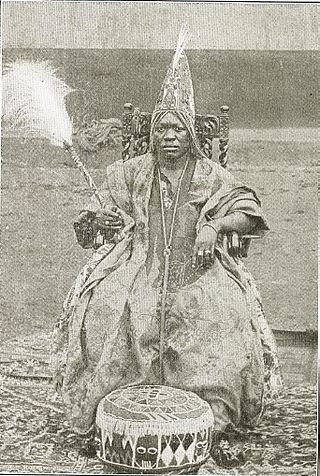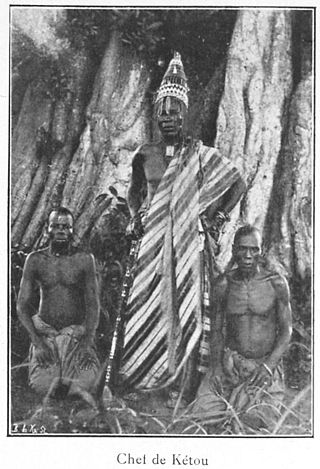
Ifẹ̀ is an ancient Yoruba city in south-western Nigeria, founded in the 6th century. The city is located in present-day Osun State. Ifẹ̀ is about 218 kilometers northeast of Lagos with a population of over 500,000 people, which is the highest in Osun State according to population census of 2006.

Candomblé Ketu is the largest and most influential branch (nation) of Candomblé, a religion practiced primarily in Brazil. The word Candomblé means "ritual dancing or gather in honor of gods" and Ketu is the name of the Ketu region of Benin. Its liturgical language, known as yorubá or Nagô, is a dialect of Yoruba. Candomblé Ketu developed in the early 19th century and gained great importance to Brazilian heritage in the 20th century.

Oba Sir Titus Martins Adesoji Tadeniawo Aderemi, alias Adesoji AderemiKCMG, KBE, was a Nigerian political figure and Yoruba traditional ruler as the Ooni (King) of Ife from 1930 until 1980. He served as the governor of Western Region, Nigeria between 1960 and 1962.

The Oyo Empire was a Yoruba empire in West Africa. It was located in present-day southern Benin and western Nigeria. The empire grew to become the largest Yoruba-speaking state through the organizational and administrative efforts of the Yoruba people, trade, as well as the military use of cavalry. The Oyo Empire was one of the most politically important states in Western Africa from the mid-17th to the late 18th century and held sway not only over most of the other kingdoms in Yorubaland, but also over nearby African states, notably the Fon Kingdom of Dahomey in the modern Republic of Benin on its west.
Ketu is the name of a Yoruba subgroup, historical kingdom and region straddling parts of what is now southeastern Republic of Benin and parts of southwest Nigeria. The chief town and traditional capital of the area was the town of Kétou (Kétu), which is considered to be one of the oldest capitals of the Yoruba-speaking people, tracing its establishment to a settlement founded by a descendant of Oduduwa called Sopasan or Soipasan. The Oba of the town were traditionally styled "Alákétu", and are related directly to Ile-Ife in present-day Nigeria. Other towns that were historically part of the Kétu Kingdom are;

Kétou is a Yoruba town, arrondissement, and commune located in the Plateau Department of the Republic of Benin. The commune covers an area of 2183 square kilometres and as of 2013 had a population of 156,497 people, making it the 13th largest settlement in Benin.

Alaafin, or The custodian of the Palace in the Yoruba language, is the title of the king of the medieval Oyo empire and present-day Oyo town of West Africa. It is the particular title of the Oba (king) of the Oyo. It is sometimes translated as "emperor" in the context of ruler of empire. He ruled the old Oyo Empire, which extended from the present-day Benin republic to Nigeria, originating from states in the South East and West to the North. The people under him are called Yoruba people and spoke the Yoruba Language.
Oba means "ruler" in the Yoruba and Bini languages. Kings in Yorubaland, a region which is in the modern republics of Benin, Nigeria and Togo, make use of it as a pre-nominal honorific. Examples of Yoruba bearers include Oba Ogunwusi of Ile-Ife, Oba Aladelusi of Akure, and Oba Akiolu of Lagos. An example of a Bini bearer is Oba Ewuare II of Benin.

Kosofe is a Local Government Area of Lagos State, Nigeria and was created on the 27th day of November 1996. Its headquarters is in the town of Kosofe and is home to several neighborhoods, including Ketu, Oworonshoki, Agboyi-Ketu, Alapere, Mile 12, and Isheri Olowora. Other notable areas include Ifako/Soluyi, Ajao Estate, Mende, Maryland, Ojota, Ogudu, Agidi, Orisigun, Kosofe, Ajelogo, Akanimodo, Ikosi-Ketu, Agiliti, Maidan, Isheri-Olowo Ira, Shangisha, Magodo, Agboyi, Owode Onirin, and Odo-Ogun.
Ado-Odo is the metropolitan headquarters of the ancient kingdom of Ado, renowned for its Oduduwa/Obatala temple, the ancient fortress of the traditional practice of Ifá. Oodu'a is also regarded by traditionalists as the mother of all deities, world over. All of these made Ado an inviolate territory in western Yorubaland—the same "father-figure" status accorded to Ile-Ife. Unlike the other kingdoms, which had at one time or the other engaged in the internecine wars that ravaged Yorubaland in the nineteenth century, Ado stood out as an unconquered sanctuary city-state throughout the period.

The Akure Kingdom is a traditional state with headquarters in Akure, Ondo State, Nigeria. It is the successor to an ancient Yoruba city state of the same name. The ruler bears the title "Deji of Akure".
Alayeluwa Oba Okunade Sijuwade CFR was the fiftieth traditional ruler or Ooni of Ife from 1980 to his death in 2015, taking the regnal name Olubuse II. He was the traditional ruler of the Yoruba Kingdom of Ile-Ife a traditional Yoruba state based in the town of Ife in Osun State, Nigeria. He was crowned on 6 December 1980 in a ceremony attended by the Emir of Kano, Oba of Benin, Amayanabo of Opobo and Olu of Warri, as well as by representatives of the Queen of the United Kingdom.
This is a list of the royal titles of Yoruba monarchs. It is not in the order of seniority.
Iwoye-Ketu is a town primarily located in Imeko Afon, Ogun State in southwest Nigeria with its western portion in Benin. The community shares a border with the Iwajowa local government area of Oyo State on the north. It is renowned for its production of cotton.

The Ekiti people are one of the largest historical subgroups of the larger Yoruba people of West Africa, located in Nigeria. They are classified as a Central Yoruba group, alongside the Ijesha, Igbomina, Yagba and Ifes. Ekiti State is populated exclusively by Ekiti people; however, it is but a segment of the historic territorial domain of Ekiti-speaking groups, which historically included towns in Ondo State such as Akure, Ilara-Mokin, Ijare, and Igbara-oke. Ogbagi, Irun, Ese, Oyin, Igasi, Afin and Eriti in the Akoko region, as well as some towns in Kwara State, are also culturally Ekiti, although belong in other states today.
The Òǹkò, otherwise known as Òkè Ògùn people, are a Yoruba people group inhabiting the areas drained by the upper Ogun river in Northwestern Oyo state in Nigeria. They were historically a part of the once expansive Oyo empire, but are distinct from the Oyo proper.









